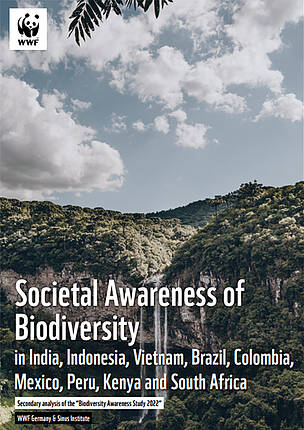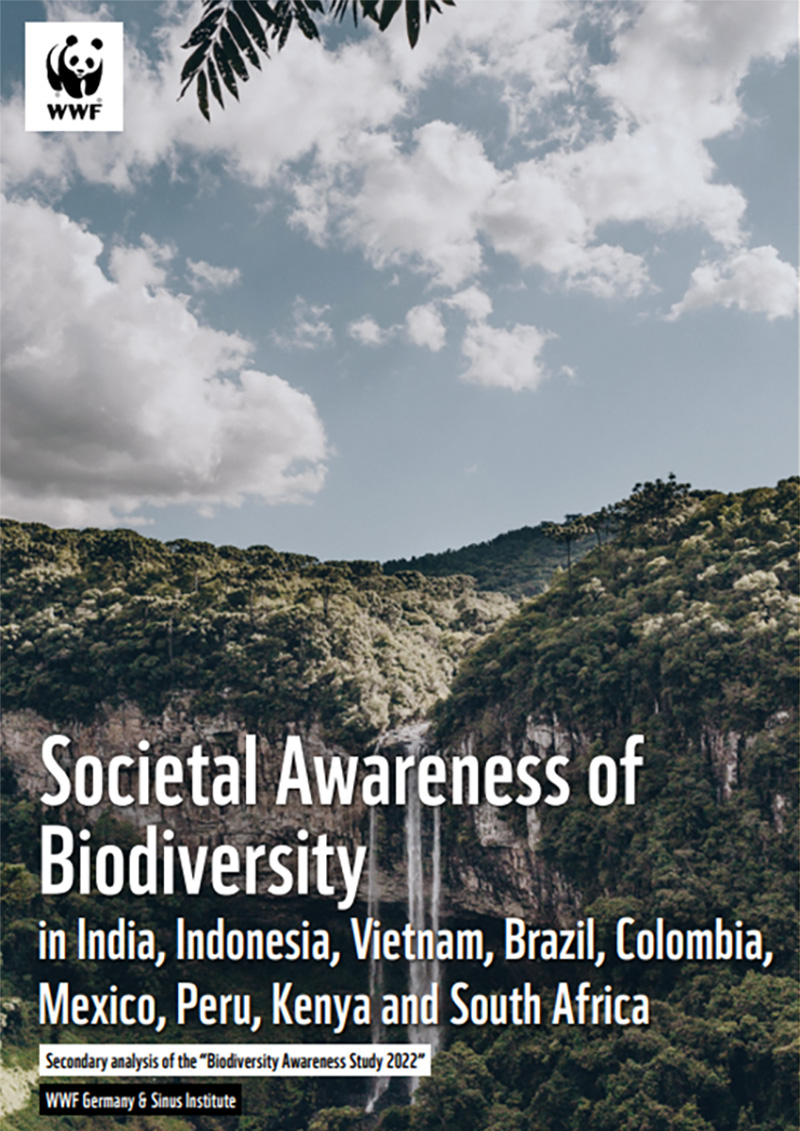WWF study analyses biodiversity awareness
Posted on 31 May 2023
What do people know about the importance of biodiversity and how has this knowledge changed over the years? WWF has conducted two studies to address this question.
Human beings play an important role in both the destruction and protection of biodiversity.This makes it all the more important to make people aware of the value of biodiversity – both for themselves and for nature.
It is equally important that we take a look at our own behaviour: What can one person do to conserve biodiversity in the long term? How willing are people in different societies in various countries to change their behaviour in a way that promotes the protection of nature?
For this reason, promoting an awareness of biodiversity has been included in various international strategies and agendas.
For example, Article 13 of the Convention on Biological Diversity (CBD) states that the contracting parties should promote and encourage an understanding of biodiversity in their countries and, to this end, develop educational programmes in order to familiarise people with the issue.
WWF conducts comprehensive studies
But to achieve this goal and to be able to evaluate changes, the foundations must first of all be laid: What do people already know about this issue?
To find out, WWF commissioned the first in-depth scientific studies to evaluate awareness of biodiversity among the population.
These studies form part of Germany’s International Climate Initiative (Internationale Klimaschutzinitiative, IKI). The first study was conducted in 2018 in ten countries; the second was intended to discover, two years later, how awareness of the issue had changed in the same ten countries.
The surveys were broken down into three main areas:
- Knowledge and understanding of biodiversity
- Attitudes towards the issue and its relevance for the individual
- Respondents’ behaviour and willingness to change their own behaviour
Only four percent of respondents knew about the two components of biodiversity: the diversity of living organisms (flora and fauna) and the diversity of habitats.
Half of the respondents stated that biodiversity was declining on earth.
In answer to the question of how human beings themselves benefit from biodiversity, only 20 percent of respondents made the connection between biodiversity and life’s necessities, such as food, fresh air or clean water.
Things that they consider important – according to the surveys, more important than a wealth of flora and fauna.
Yet most respondents stated that conserving biodiversity must be a priority for society and – a very positive finding – that responsibility for this definitely lies with them themselves but above all with policymakers.
The majority pointed out that policy measures have a major impact on conserving biodiversity.
But what about their own actions? Most respondents said that they wanted to take concrete steps in future to protect biodiversity.
Such steps included raising awareness of the issue among people they knew, wasting less food and water, recycling and saving energy.
Findings of the second study
Four years later, in 2022, WWF conducted a follow-up study in nine countries (China was not included on this occasion) in order to find out how awareness of biodiversity had changed among the population.
The results were very encouraging: 81 percent of respondents described the term biodiversity as the diversity of flora, fauna and living creatures; however, as before, there was little mention of habitats or genetic diversity.
Even if this understanding does not entirely capture the true importance of biodiversity, understanding has improved in most countries.
However, when it is a case of what impact biodiversity has on a person's own life, there is, as in the past, room for improvement: while 79% percent of respondents connect things like “balance in the natural order” or “climate control” with biodiversity, only a small proportion recognise the effect that biodiversity has on their own lives.
There is a great willingness to take various measures to protect biodiversity and this has increased since 2018.
While information and the choice of alternative, environmentally friendly behaviours are the most popular measures that people are willing to take, measures that entail people having to pay more are not so popular.
Why are we doing all of this?
Why is it so important to find out about social awareness of biodiversity? It is a starting point for developing measures for conserving and sustainably using biodiversity.
At the same time, the evaluation can be used to make awareness and the willingness to change people’s behaviour in a way that benefits nature measurable.
Have the policymakers achieved their goals?
These findings are also important for developing future policy, institutional and civil society interventions, including publicity campaigns and educational programmes.
After all, it is only people who know the value of biodiversity who can advocate for its conservation and call for sustainable action.
Further information and downloads
Presentation Assessment of Societal Biodiversity Awareness 2022
Presentation Assessment of Societal Biodiversity Awareness 2018
Comparing the Societal Biodiversity Indicator in Africa, Asia and Latin America
Raw data of the studies

